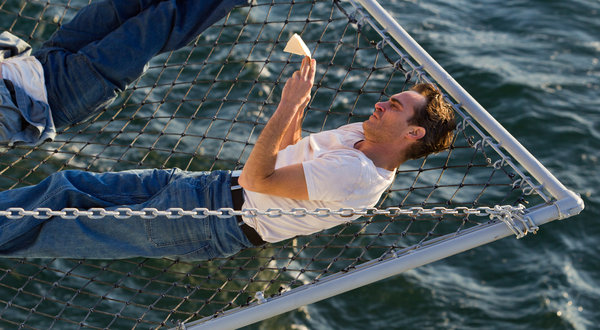Mr. Phoenix, 37, is back here this year, and things are a bit more straightforward this time. He’s the star of the festival’s most eagerly anticipated movie, “The Master,” directed by Paul Thomas Anderson, and to judge from the response from critics and audiences here, a leading contender for its best actor prize, which can only bode well as awards season gets under way.
Before its premiere on Saturday there had been speculation that “The Master,” Mr. Anderson’s first film since “There Will Be Blood” in 2007, would be an exposé of Scientology. But its story of a new fringe religion in postwar America, while inspired by Dianetics and the early career of L. Ron Hubbard, is merely the backdrop for an exploration of man’s animal nature and civilization and its discontents. These issues are refracted through the relationship between a seductive guru (Philip Seymour Hoffman) and a follower with a wild streak, played by Mr. Phoenix in his first screen appearance in two years since “I’m Still Here.”
In an interview on Sunday at the Excelsior Hotel here, Mr. Phoenix, casually dressed in a denim shirt and facial hair long gone, said that his last film — although greeted in most quarters with befuddlement or hostility — represented an important turning point. “It completely broadened my perspective on acting,” he said, seeming much more relaxed than at the previous day’s news conference, during which he spoke only once and wandered offstage at one point. “I wanted to have that same experience that anything is possible.”
Looking to re-establish himself, Mr. Phoenix read — and passed on — many scripts. Freddie Quell in “The Master” was the first role that drew his interest. A troubled World War II veteran, Freddie is both the feral opposite number of and the unlikely kindred spirit to Mr. Hoffman’s smooth-talking peddler of salvation, Lancaster Dodd.
In an interview on Sunday, Mr. Anderson said he wrote the role of Dodd for Mr. Hoffman, his regular collaborator; for Freddie, he knew he needed “a formidable opponent for Phil.” The prospect of working with Mr. Phoenix excited them both: “I remember Phil saying, ‘Joaquin scares me, in a good way,’ ” Mr. Anderson said.
Mr. Phoenix started as a child actor, and since his breakthrough role, at 21, in Gus Van Sant’s “To Die For,” he has emerged from the shadow of his late brother River, cultivating a reputation as one of Hollywood’s most intense young actors. He has two Academy Award nominations, for playing the sneering villain in “Gladiator” and for his fully committed portrayal of Johnny Cash in “Walk the Line.” But in none of his previous roles does he approach the sheer volatility and physicality that he brings to “The Master.”
“I knew he was going to be good, but I didn’t know he was going to do this,” Mr. Anderson said. “I was unprepared for the level of inventiveness and creative energy that comes out of him. And the level of discipline. By all appearances it looks like he has no discipline, but that’s just a cover story.”
Early on, Mr. Phoenix said: “I told Paul I wasn’t going to self-modulate in any way. I wanted to just expose the id.”
The lessons of “I’m Still Here” inspired him to experiment. “Going out on a stage publicly and not knowing how people are going to react to you — once I experienced that, it made me feel much more comfortable about going into a scene,” Mr. Phoenix said. On “The Master” he tried out different interpretations of lines and scenes, even going for “things that might seem absurd or stupid or don’t make sense or are obviously, quote-unquote, out of character.”
Mr. Anderson said that for much of the shoot, Mr. Phoenix stayed in character. Mr. Phoenix, for his part, dislikes the actorly pretensions of the phrase — “I just hate hearing ‘staying in character,’ ” he said — but he acknowledged the importance of sustaining tension in this case. “Freddie was so extreme,” he said. “I couldn’t physically release and let my body relax, then go back into it.”
His reliance on instinct meant that the first takes were often the most electrifying. “He’s pretty bad at faking it,” Mr. Anderson said. “If a moment gets lost, it’s pretty hard for him to come back to shore. It became clear to me that you better get your lighting right the first time.”
Mr. Phoenix spoke of his rejuvenated career — next up: films with James Gray and Spike Jonze — in terms of a renewed appetite for risk. “For some people acting is a sunset stroll on a beach, and for others it’s scaling a cliff or jumping out of a plane,” he said. “In so much of my life, I take sunset strolls on the beach. When I act, I like the idea of jumping out of the plane.”
On “The Master” both actor and director took pains to emphasize Freddie’s animal side. Mr. Anderson said he showed Mr. Phoenix the first shot of the epic film poem “Baraka,” of a monkey falling asleep: “I said, ‘That’s you.’ ”
For a scene in which Freddie and Lancaster are thrown into neighboring prison cells — sending Freddie into a head-banging, toilet-smashing rage — Mr. Phoenix studied online videos of wild animals in captivity. “You can see that their brains don’t seem to be functioning anymore,” he said. “It’s pure reaction, and you see the muscles going. I knew that’s what I wanted to capture — they’re hurting themselves, and they don’t even know that, but something inside is saying get out, get out.”
That scene was not supposed to end with Mr. Phoenix stomping on the commode.
“I didn’t intend to break the thing,” Mr. Phoenix said. “I didn’t know that was possible.”
.gif)




.jpg)


